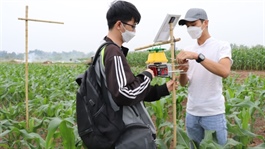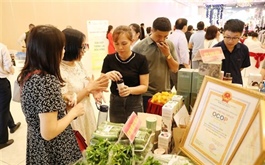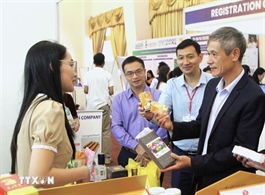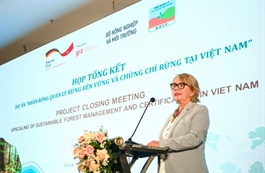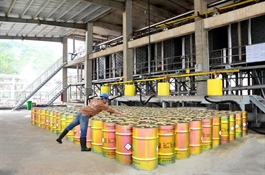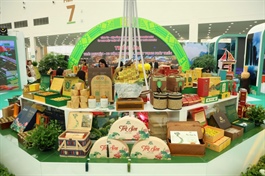Vietnamese farm producers embrace e-commerce models
Vietnamese farm producers embrace e-commerce models
E-commerce platforms are increasingly becoming a bridge to help Vietnamese agricultural products expand their markets and increase value.
The Vietnamese Agricultural Product Week organised by the Vietnam Agricultural Trade Promotion Centre, in collaboration with TikTok Shop over a week ago, opened up opportunities to stimulate consumption of local agricultural products.
The event included eight livestream sessions, with each focused on a group of products from the agricultural industry such as rice, tea and coffee, fruit, One Commune, One Product (OCOP) items, handicraft products, and products.
Nguyen Lam Thanh, representative of TikTok Vietnam, said that the series of activities has brought positive results, with 50 livestream sessions selling speciality fruits generating nearly 10,000 orders in just 72 hours.
Meanwhile, 60 OCOP markets and handicraft livestreams recorded more than 12,500 orders, and 45 sessions featuring products from 56 national brands created over 4,000 orders within 48 hours.
“Not only do these programmes arouse pride in Vietnamese products among a community of more than 70 million users, they also bring in hundreds of thousands of orders and significantly enhance Vietnamese brand recognition on the TikTok Shop platform,” Thanh said.
E-commerce platforms in general are gradually asserting their role as strategic distribution channels for Vietnamese agricultural products. This trend expands the market and promotes digital thinking, changing the way businesses and farmers approach consumers in a more professional and sustainable way, Thanh added.
According to Nguyen Minh Tien, director of the Agricultural Trade Promotion Centre, the number of agricultural products on e-commerce platforms has increased by 30 per cent compared to 2024. By the end of the second quarter of 2025, more than 13,000 OCOP items were introduced on digital platforms and reached international consumers.
“In the context of e-commerce growing at an average of 25 per cent per year, along with changing consumer habits, advertising agricultural products and OCOP items on online platforms is no longer an option but has become an inevitable requirement,” Tien noted.
The Exploring Food Category Opportunities on Amazon 2025 report, released by the platform in early August, emphasised that Vietnam possesses a rich source of agricultural products, from tropical fruits to traditional spices, a great advantage for expanding exports. Over the years, Vietnamese agricultural products have gradually established a solid position in the world market through traditional exports.
Figures from the Vietnam Customs showed that in the first eight months of this year, Vietnam’s fruit and vegetable export turnover reached more than $4.6 billion. China still leads the export market with a value of $2.1 billion, the US is a bright spot when exports to this market reached $316 million, achieving the highest growth rate in the industry at 67 per cent. Items favoured by US consumers include bananas, guava, dragon fruit, fresh coconut, and mango.
“This data showed that Vietnam has enough advantages to boost consumer food exports to the US. Both manufacturers and trading units can quickly penetrate the market as US consumer trends are increasingly favouring healthy, reasonably priced products such as rice noodles or tropical fruits, which are Vietnam’s strengths,” the report stated.
Amazon’s report also suggested three more potential food groups for Vietnamese sellers: dried fruit and vegetables, spices, and tea. The document also emphasised that the explosion of the digital age is creating conditions for Vietnamese businesses to connect directly with global consumers through e-commerce platforms, diversify export channels and enhance brand value.
Nguyen Trung Dung, CEO of regional speciality spice brand DH Foods, said that the most important factor when starting to export products on e-commerce platforms is to research the market and prepare the products well.
“The US market is huge, and about 30 million are of Asian origin and three million are of Vietnamese origin. Previously, it was almost impossible for a small business to export to the US because of the high cost, but thanks to cross-border e-commerce platforms, businesses have data to research trends and get support to get started,” Dung said.
This opens up opportunities for many Vietnamese businesses to not only export raw materials but also build brands. “Of course, to do that, businesses must invest more, meet strict production processes and achieve international certification,” Dung added.
DH Foods currently boasts more than 100 products, many of which are designed specifically for each market. Although it only started selling in 2022, the company sold more than 8,000 units in 2023 and doubled that last year.
One notable success story is NewBam, a Vietnamese startup founded by Nguyen Huynh Thu Truc, which has harnessed Amazon to bring premium cashew nuts to global consumers. By focusing on sustainable farming, strict quality control, and attractive packaging tailored to Western markets, NewBam’s products have gained strong traction in the US, Europe, and Japan.
“Cross-border e-commerce reduces the role of intermediaries and also enables direct engagement with international buyers, allowing us to share the story of Vietnamese agriculture in a more authentic way,” Truc said.
According to the Vietnam E-commerce Association, global cross-border e-commerce exports are forecast to continue their upward trajectory, with total turnover expected to reach $4 trillion by 2027. Against this backdrop, Vietnam’s online export value is projected to climb to $5.8 billion by 2028.
Association chairman Nguyen Ngoc Dung noted that agricultural products, food and beverages, handicrafts, and apparel are among the fastest-growing segments in this field.
“With e-commerce, even small businesses and farmers can access international markets directly, without depending heavily on traditional intermediaries,” Dung said.
He stressed that in order to fully seize opportunities, Vietnam must accelerate digital transformation in logistics, streamline customs procedures, and strengthen cross-border payment systems.
“If these conditions are met, cross-border e-commerce could evolve into a multi-million-dollar industry within the next five years, making a substantial contribution to Vietnam’s export-driven growth ambitions,” he added.
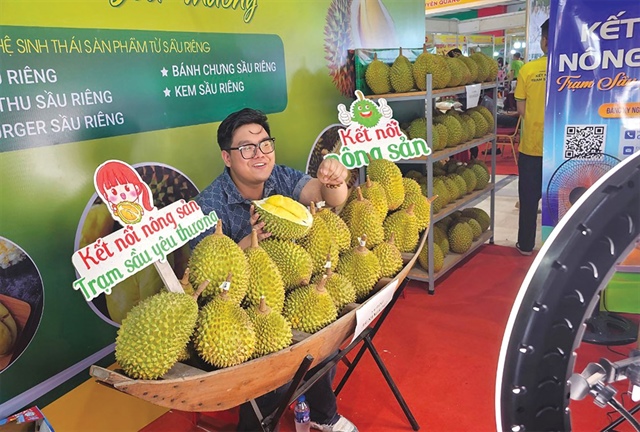
The digital age is creating conditions for Vietnamese businesses to connect with global consumers, photo Le Toan |
Larry Hu, CEO, Amazon Global Selling Southeast Asia
Consumer trends vary by product category, but across markets there is growing demand for items that are natural, sustainable, and tied to unique cultural stories. This is where Vietnam’s agricultural products hold exceptional promise on Amazon. With a rich supply of tropical fruits, nuts, coffee, tea, and distinctive spices, Vietnamese sellers can tap into the rising appetite for healthier, authentic, and exotic food choices among global consumers.
We regularly publish industry-specific handbooks to help domestic businesses capture these opportunities, offering insights into international consumer preferences, seasonal demand, packaging requirements, and design suggestions. These resources, together with tools like the Product Opportunity Explorer, provide a clear roadmap for Vietnamese exporters, particularly in agriculture, to match their strengths with market demand.
Over the past five years, the fastest-growing categories for Vietnamese sellers on Amazon include home, kitchen, health and personal care, apparel, and beauty. However, looking ahead, we see Vietnamese food and agricultural products becoming a key pillar of the Viet-Selection programme, which highlights the nation’s unique strengths to international buyers.
By understanding the right consumer trends and leveraging cross-border e-commerce, Vietnam’s agricultural producers, from cashew and coffee growers to tea and spice exporters, can build brands that resonate globally, opening new growth pathways while showcasing the richness of the country’s agriculture to the bigger world.
Vu Quoc Bao, CEO, Vinalink Logistics
Vietnamese businesses participating in online exports have experienced rapid growth recently, especially in handicrafts, wooden furniture, processed foods, particularly in the US market. E-commerce platforms have provided conditions to facilitate Vietnamese businesses in reaching a wide range of customers globally.
Additionally, the logistics infrastructure is increasingly improving and contributing to supporting the shipment of Vietnamese goods to cross-border e-commerce platforms.
However, Vietnamese businesses have not yet fully standardised their labels, packaging, and do not have a deep understanding of import processes and regulations. This leads to goods being returned or held at customs for inspection, resulting in additional costs for the businesses. Additionally, the lack of transit warehouses also affects the delivery process and optimisation of logistics costs.
The export process through e-commerce platforms presents a great opportunity for Vietnamese businesses. If businesses invest seriously, especially considering exports on e-commerce platforms as a strategic and long-term sales channel, alongside the current traditional business-to-business sales channels.
- 15:09 18/09/2025




